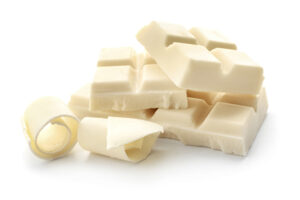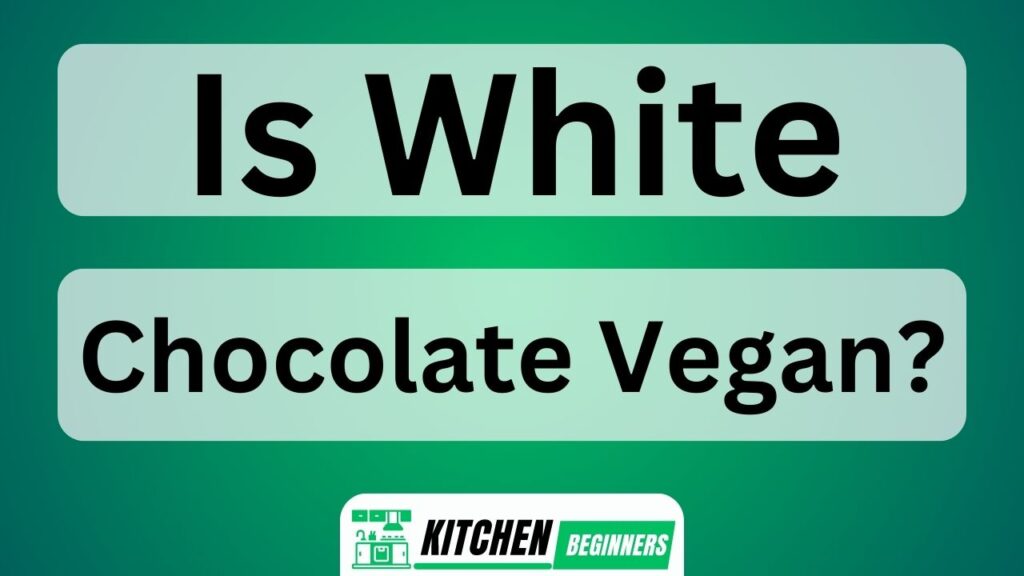Did you know that white chocolate is often a topic of debate among vegans? With its creamy texture and sweet flavor, it’s no wonder why many people are curious about whether or not it fits into a plant-based diet.
In this article, we will explore the question ‘Is white chocolate vegan?’ by examining its ingredients, discussing the ethics surrounding its production, and exploring potential alternatives for those who choose to follow a vegan lifestyle.
So let’s dive in and uncover the truth about this indulgent treat.
Key Takeaways Is White Chocolate Vegan
- White chocolate typically contains milk solids or milk powder, making it non-vegan.
- Vegan-friendly white chocolate brands use plant-based alternatives like rice milk or almond milk instead of animal-derived ingredients.
- DIY vegan white chocolate recipes can be made using cocoa butter, coconut oil, and powdered sugar substitutes.
- Individuals should explore vegan white chocolate options or moderate their consumption of traditional white chocolate for optimal well-being.
The Origin of White Chocolate
White chocolate isn’t technically considered real chocolate because it doesn’t contain cocoa solids. It originated in Switzerland in the 1930s, when Nestle created a product called Milkybar. This marked the beginning of white chocolate’s journey into the confectionery world.

The manufacturing process involves blending cocoa butter with sugar, milk solids, and flavorings such as vanilla. Cocoa butter is the fatty component of the cacao bean and gives white chocolate its smooth and creamy texture. The mixture is then heated and conched to refine its consistency before being molded into bars or other shapes.
While white chocolate may not have the same depth of flavor as dark or milk chocolate, it remains a popular treat for those who enjoy its unique taste and texture.
What Is White Chocolate Made Of
Dairy-free white chocolate is a popular alternative for those who cannot consume dairy products. It is typically made with cocoa butter, which gives it its creamy texture and rich flavor.

Vanilla is also commonly added to enhance the taste of dairy-free white chocolate.
Dairy-Free White Chocolate
If you’re looking for a dairy-free option, you’ll be pleased to know that there are vegan white chocolate alternatives available. Here are three options to consider:

- Vegan White Chocolate Brands: There are several brands that offer dairy-free white chocolate products. Some popular ones include Enjoy Life, which makes allergy-friendly chocolates using rice milk, and No Whey Foods, known for their vegan and gluten-free white chocolate bars.
- Homemade White Chocolate Recipe: If you prefer making your own white chocolate at home, it’s possible to create a delicious dairy-free version using simple ingredients like cocoa butter, powdered sugar or a natural sweetener like maple syrup, vanilla extract, and non-dairy milk such as almond or soy milk.
- Other Plant-Based Alternatives: While not technically ‘white chocolate,’ there are other plant-based options that can provide a similar creamy and sweet taste. For example, you can melt down vegan white baking chips or use coconut cream mixed with vanilla extract and sweetener as a substitute.
With these options in mind, those who follow a vegan or dairy-free lifestyle can still enjoy the taste of white chocolate without compromising their dietary choices.
Vanilla and Cocoa Butter
When making your own homemade vanilla-flavored white chocolate, you’ll need to use cocoa butter and vanilla extract for that delicious taste.

Cocoa butter is the main ingredient in white chocolate and provides its smooth and creamy texture. It is derived from cocoa beans and has a mild chocolate flavor.
Vanilla extract, on the other hand, is used to enhance the overall taste of the white chocolate. It adds a sweet and fragrant aroma that complements the rich flavors of cocoa butter.
While some recipes may call for additional ingredients like milk powder or sugar, cocoa butter and vanilla extract are essential components for creating authentic homemade white chocolate.
Understanding Veganism and Plant-Based Diets
Plant-based diets and veganism have gained significant attention in recent years due to their numerous health benefits. Research has shown that individuals who follow plant-based diets tend to have lower rates of obesity, heart disease, and certain types of cancer.
Moreover, by adopting a vegan lifestyle, individuals also contribute to the welfare of animals by avoiding their exploitation for food and other products.
Benefits of Plant-Based Diets
You can reap numerous benefits by adopting a plant-based diet, such as increased energy levels and improved digestion. Here are three specific advantages of following a plant-based diet:
- Improved Heart Health: Plant-based diets tend to be low in saturated fat and cholesterol, which can reduce the risk of heart disease. Incorporating more fruits, vegetables, whole grains, and legumes into your meals can promote cardiovascular health.
- Weight Management: Plant-based diets are generally lower in calories and higher in fiber compared to animal-based diets. This combination can help with weight management as it promotes feelings of fullness and reduces the consumption of unhealthy processed foods.
- Positive Environmental Impact: By choosing plant-based recipes over meat-heavy dishes, you contribute to reducing greenhouse gas emissions, land degradation, water pollution, and deforestation associated with animal agriculture.
Transitioning into the next section about veganism and animal welfare, it’s important to note that adopting a plant-based diet not only benefits personal health but also aligns with ethical considerations towards animals’ well-being.
Veganism and Animal Welfare
Transitioning to a vegan lifestyle involves making choices that prioritize animal welfare and ethical considerations. Veganism is not only about dietary choices, but also encompasses broader concerns such as sustainability and the ethical implications of consuming animal products. By embracing a vegan lifestyle, individuals contribute to reducing their carbon footprint and minimizing the harm inflicted upon animals in factory farming.
The livestock industry is a significant contributor to greenhouse gas emissions and deforestation, which have detrimental effects on our planet’s health. Ethically, veganism recognizes animals as sentient beings deserving of respect and compassion, challenging the notion that they exist solely for human consumption. Transitioning to a vegan diet can be seen as an act of kindness towards all living creatures, promoting a more sustainable and compassionate way of life.
As we delve deeper into the topic of veganism, it is important to address specific food items like white chocolate. Is white chocolate dairy-free?
Is White Chocolate Dairy-Free
Is white chocolate really dairy-free? Many people assume that white chocolate, being lighter in color, is made without any dairy products. However, this assumption is not entirely accurate. White chocolate does contain milk solids and milk fat, which means it is not suitable for those who follow a dairy-free diet or have lactose intolerance.
For individuals looking for dairy-free chocolate options or vegan white chocolate substitutes, here are three alternatives:
- Vegan White Chocolate Chips: These chips are made from plant-based ingredients such as coconut oil and cocoa butter.
- Dairy-Free White Chocolate Bars: Some companies offer dairy-free versions of white chocolate bars using alternative ingredients like rice milk or almond milk.
- Homemade Vegan White Chocolate: By combining cocoa butter, powdered sugar, vanilla extract, and non-dairy milk, one can create their own vegan-friendly white chocolate.
Now that we understand the limitations of white chocolate in terms of being dairy-free, let’s delve into the debate over white chocolate and veganism…
The Debate Over White Chocolate and Veganism
Now that we’ve covered the limitations of white chocolate in terms of being dairy-free, let’s explore the ongoing debate surrounding its compatibility with veganism. One of the main points of contention in this debate is the ingredients used in white chocolate. While traditional chocolate contains cocoa solids and cocoa butter, white chocolate is made from cocoa butter, sugar, and milk solids or milk powder. This inclusion of milk products raises ethical concerns for vegans who abstain from consuming any animal-derived ingredients.
To better understand this debate, let’s take a look at a table comparing the ingredients found in different types of chocolate:
| Chocolate Type | Cocoa Solids | Cocoa Butter | Milk Solids/Powder |
|---|---|---|---|
| Milk Chocolate | Yes | Yes | Yes |
| Dark Chocolate | Yes | Yes | No |
| White Chocolate* | No | Yes | Yes |
*White chocolate can also contain other flavorings such as vanilla.
As seen in the table, white chocolate does contain milk solids or powder, making it unsuitable for strict vegans. However, it is important to note that there are some brands that produce vegan-friendly white chocolates using alternative plant-based ingredients such as rice milk or almond milk instead of cow’s milk. These alternatives aim to address the ethical concerns surrounding traditional white chocolate production.
Are There Vegan Alternatives to White Chocolate
There are plant-based alternatives available for individuals following a vegan lifestyle who still crave a creamy and sweet treat similar to white chocolate. Here are three options to satisfy those cravings:
- Vegan White Chocolate Brands: Several companies offer vegan white chocolate bars and chips made from non-dairy ingredients like coconut milk, almond milk, or rice milk. These brands often use natural sweeteners like maple syrup or agave instead of traditional dairy-based sugars.
- DIY Vegan White Chocolate Recipes: If you prefer to make your own white chocolate at home, there are plenty of recipes online that use ingredients like cocoa butter, coconut oil, and powdered sugar substitutes such as stevia or erythritol. These recipes allow you to customize the flavor and sweetness level to your liking.
- White Chocolate Alternatives: While not technically ‘white chocolate,’ some vegan-friendly alternatives can provide a similar taste and texture. For instance, using melted coconut cream mixed with vanilla extract and sweetener can create a creamy and decadent substitute.
Whether you choose ready-made brands or decide to get creative in the kitchen, there are plenty of options available for vegans who want to enjoy the indulgence of white chocolate without compromising their dietary choices.
White Chocolate and Animal Testing
Using cruelty-free alternatives is a compassionate choice for those concerned about animal testing in the production of white chocolate. White chocolate has a significant environmental impact, with ethical concerns surrounding its production. The table below highlights some key factors contributing to these concerns:
| Environmental Impact | Ethical Concerns |
|---|---|
| Deforestation due to cocoa bean cultivation | Exploitation and poor working conditions of laborers |
| High water usage during processing | Child labor in cocoa farms |
| Carbon emissions from transportation and packaging | Biodiversity loss due to habitat destruction |
These environmental and ethical issues associated with white chocolate production raise important considerations for consumers. Transitioning into the next section about health considerations for white chocolate lovers, it becomes evident that there are multiple aspects to take into account when making choices regarding this indulgent treat.
Health Considerations for White Chocolate Lovers
Transitioning into the health considerations of white chocolate lovers, it’s important to be mindful of the potential impact on one’s well-being. While white chocolate may be a delightful treat for many, it is essential to understand the nutritional aspects and make informed choices. Here are three factors to consider:
- High sugar content: White chocolate typically contains a significant amount of sugar, which can lead to weight gain and an increased risk of developing conditions like diabetes.
- Lack of antioxidants: Unlike dark chocolate, which is rich in antioxidants, white chocolate lacks these beneficial compounds that help fight inflammation and protect against various diseases.
- Health benefits of cocoa butter: Although white chocolate lacks cocoa solids, it does contain cocoa butter. Cocoa butter has moisturizing properties and may provide some benefits for skin health.
Considering these factors, individuals should explore vegan white chocolate options or moderate their consumption of traditional white chocolate products for optimal well-being.
Moving forward into the subsequent section about ‘tips for finding vegan white chocolate products,’ let’s examine how individuals can enjoy this delectable treat while adhering to their dietary preferences.
Tips for Finding Vegan White Chocolate Products
After considering the health aspects of white chocolate, it is important to address the question of whether or not there are vegan options available for those who follow a plant-based diet. Fortunately, there are several vegan white chocolate brands on the market that cater to this dietary preference.
Brands such as Enjoy Life, Go Max Go Foods, and Plamil offer vegan white chocolate bars and chips that are made without any animal-derived ingredients. These products typically use alternative ingredients like coconut milk or rice milk powder to create a creamy texture and rich flavor similar to traditional white chocolate.
In addition to enjoying vegan white chocolate as is, it can also be utilized in various recipes. From vegan white chocolate chip cookies to drizzling melted white chocolate over desserts or adding it to homemade granola bars, there are endless possibilities when it comes to cooking with vegan white chocolate.
When looking for vegan alternatives, reading labels carefully and conducting research on specific brands is crucial. By doing so, individuals can indulge in delicious treats while adhering to their dietary preferences.
Frequently Asked Questions
Can White Chocolate Be Considered Vegan if It Doesn’t Contain Any Animal-Derived Ingredients?
White chocolate production typically includes milk, making it non-vegan. However, there are vegan white chocolate options available that use alternative ingredients such as plant-based milks and fats.
Is White Chocolate Made From Cocoa Beans?
White chocolate is made from cocoa butter, milk solids, and sugar. While it does not contain cocoa beans themselves, the manufacturing process involves extracting cocoa butter from the beans. The environmental impact of white chocolate production varies depending on factors such as sourcing and waste management practices.
Are There Any Vegan Alternatives to White Chocolate Available in the Market?
There are several vegan white chocolate options available in the market for those who want to enjoy the flavor of white chocolate without using animal products. These alternatives provide a similar taste and texture.
Does White Chocolate Undergo Animal Testing During Its Production?
White chocolate is not vegan, but its production does not necessarily involve animal testing. However, it’s important to note that ethical production practices vary across brands, so consumers should research before purchasing.
What Are Some Health Considerations for Individuals Who Consume White Chocolate?
White chocolate has a high calorie and fat content, making it less suitable for weight management. While it contains minimal nutritional value compared to dark or milk chocolate, moderation is key in any diet.
Conclusion
In conclusion, while white chocolate may seem like a tempting treat for vegans, it is important to note that most traditional white chocolate contains dairy and is therefore not suitable for a vegan diet.
However, there are vegan alternatives available on the market that use plant-based ingredients instead of dairy. It is crucial for individuals following a vegan lifestyle to read labels carefully and seek out certified vegan products.
Remember, just as in the world of white chocolate, sometimes things are not always what they appear to be.




